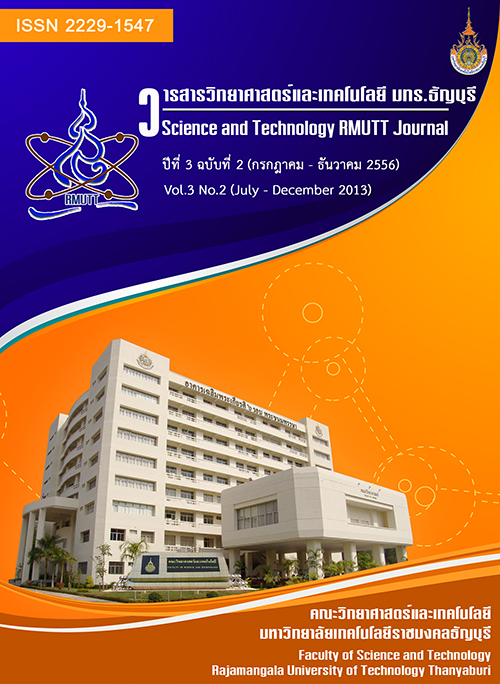Study on Production of 5'-Phosphodiesterase from Halotolerant Bacillus sp. RMUT 001
Main Article Content
Abstract
The optimum conditions for growth and 5´ phosphodiesterase (5’- PDE) production from a halotolerant Bacillus sp. RMUT 001 isolated from raw fish sauce in Sehgal and Gibbons Complex (SGC) liquid medium were studied. The results showed that a halotolerant Bacillus sp. RMUT 001 could produce the highest 5´- PDE activity at pH of 7.0 and temperature of 37 oC in SGC liquid medium without NaCl. Cultivation of Bacillus sp. RMUT 001 in shaking flasks at optimum conditions found that enzyme secretion was coupled to cell multiplication and maximum activity was obtained at stationary phase. The maximum 5´- PDE production was 0.98 U/ml after 5 days cultivation. Enzyme was partially purified by 50% ethanol precipitation (by volume). The purity of 5´- PDE was increased 17.79 folds and yield of 73.67% was obtained.
Article Details
References
A. Kuninaka, M. Kibi, H. Yoshino, and K. Sahaguchi, “Studies on 5'-phosphodiesterases in microorganisms. Past 2. Properties and application of Penicllium citrinum 5'phosphodiesterases,” Agric. Biol. Chem, vol. 25, pp. 693-701, 1961.
F. Egami, and K. Nakamura, Microbial Ribonucleases,Heidelberg : Springer-Verlag, 1969.
E.V. Kumar, M. Srijana, K. Chaitanya, Y.H.K. Reddy, and G. Reddy, “Biodegradation of poultry by a novel bacterial isolate Bacillus altitudinis GVC11,” Indian Journal of
Biotechnology, vol. 10, pp. 502-507, 2010.
A.J. Deoda, and R.S. Singhal, “5-Phosphodiesterases (5-PDE) from germinated barley for hydrolysis of RNA to produce flavor nucleotides,” Bioresour. Technol, vol. 88, pp. 245-250, 2003.
Y.G. Qing, L.E. Shi, Y. Yu, T.Z. Xing, and C.J. Shu, “Production, purification and chareacterization of nuclease p1 from Penicillium citrinum,” Process Biochemistry, vol. 41, pp. 1276-1281, 2006.
S.N. Sehgal, and N.E. Gibbons, “Effect of some metal ions on the growth of Halobacterium cutirubrum,” Can. J. Microbiol, vol. 6, pp. 165-169, 1960.
M. Fujimoto, A. Kuninaka, and H. Yoshino, “Purification of a nuclease from Penicillium citrinum,” Agric Biol Chem, vol. 38, pp. 83-777, 1974.
D.J. Kushner, “Life in high salt and solute concentrations : Halophilic bacteria,” in Microbial Life in Extreme Environments. D.J. Kushner, ed., London : Academic Press, 1978, pp. 317-368.
M.J. Garabito, M.C. Maquez, and A. Ventosa, “Halotolerant Bacillus diversity in Hypersaline Environments,” Can. J. Microbiol, v.ol 44, pp 95-102, 1998.
K. Ikeda, “Characterization of extracellular halophilic ribonuclease from halotolerant Pseudomonas sp.,” M.S. Thesis Kasetsart University, 2000.
D. Lee, Y. Kok, K. Kim, B. Kim, H. Choi, D. Kim, M.T. Suhartono, and Y. Pyun, “Isolation and characterization of a thermophilic lipase from Bacillus thermoleovorans ID-1,” FEMS Microbiol. Lett. vol. 179, pp. 393-400.


